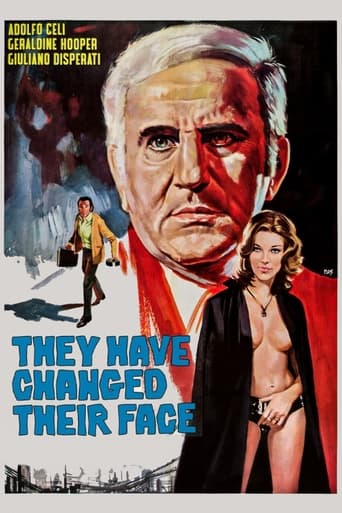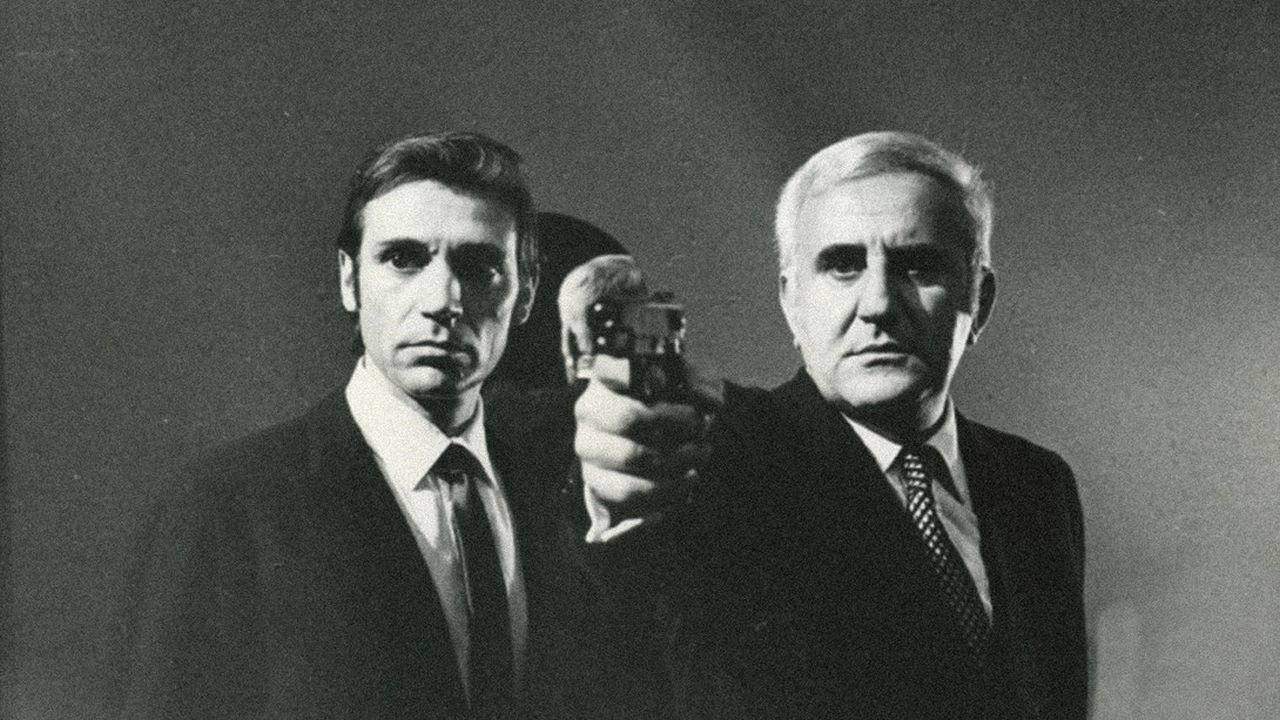Gymnopedies
They Have Changed Their Face is perhaps the most innovating and original take on the Bram Stoker's novel Dracula. In this intoxicating allegory on capitalism, they substituted the well- trodden Dracula with a successful and powerful businessman, Giovanni Nosferatu, the head of a massive corporation, who invites a low- ranking employee to, from what appears on the exterior as an old dilapidated villa. As soon as he arrives in the locality - things are not quite what they seem. He soon finds the locale nearly deserted with the heavy fog enveloping everything in sight. He tries to ask the few locals for directions but they are behaving most peculiarly, non-compliant and almost in a trance. That should have been a deterrent! Before entering the villa, he meets a young attractive woman. She promptly changes her outward behavior from a free-spirit to a tense and overly manner. The employee eventually comes to the conclusion to himself that, Giovanni Nosferatu, is a vampire.There are many strange and intriguing details in the film such as the villa, from the exterior, appears as an old dilapidated villa that is crumbling with ancient grounds to a highly modernistic interior, well-stocked with apparatuses that vents out adverts for the products that his corporation sells. From the intimidating band of cars that patrol the grounds of the villa that kills anyone who is trespassing to marketing of illicit products like "domestic LSD" or the nursery offering predetermined career paths for babies. It is a very well- made and stylish horror that throws around references to Godard, Fellini and Bergman. I'm sold!It is an obvious allegory to capitalism, with the most affluent portrayed as "vampires" who appear to feed off consumerism, hence why They Have Changed Their Face. It is a biting and satirical moody piece, but above all, it is really good and at just 285 votes-it is shockingly unknown to the masses. If this was made in 2017 we would all be saying it was way ahead of its time, but it was in fact made in 1971! They Have Changed Their Face is a thoroughly original and intelligent slice of Italian horror.
matheusmarchetti
After re-watching this obscure Italian gem, I'm even more convinced that Corrado Farina is a true neglected maestro of Italian horror cinema. Granted, he's only made four films, two of them being horror (the other one is the delirious fumetti adaptation "Baba Yaga"), but they really shows a unique style that is hardly seen elsewhere in the genre. In fact, even more so than "Baba Yaga", "Hanno Cambiato Faccia" is something of a black sheep of 70's Italian horror. The most obvious difference is the look of the film. While most of it's kind are photographed with Bavaesque colors, this one is almost completely pale and "lifeless", with all the exterior scenes filmed in nearly deserted, fog-shrouded landscapes and with stark white, minimalist interiors. Corrado's script is also very well written and intelligent. Something of a loose adaptation of Bram Stoker's "Dracula", set in 1970's Italy, we follow a young man who goes to visit his boss - Giovanni Nosferatu, the head of a huge corporation, at his secluded country villa, in order to get a promotion. As soon as he gets there, however, he soon realizes there's something not quite right with Mr. Nosferatu, and he eventually comes to the conclusion that the man is a vampire. Not unlike Hans Geissendorfer's eccentric masterpiece "Jonathan", this is an obvious allegory to capitalism, with corporate tycoons presented as vampires who feed on the expenses of their consumers, and the title means that these foul beings are still living in our modern society, only under a different image. The metaphor is presented very subtly, and doesn't come across as being pretentious. The film's finale, though some can see as being anti-climatic, actually enhances this, and leaves a haunting, lingering impression, rather than a shocking one, on the viewer. One of the film's greatest assets is the contrast between classic Gothic imagery with high-tech, ultra-modern settings. Nosferatu's villa is, on the outside, old and crumbling, surrounded by a foreboding forest and an ancient cemetery. There's also a nearby village with the creepy innkeeper-ish character who warns the protagonist of his destination before he gets there. Hell, there's even a cobwebbed crypt for the vampire to sleep in. Another brilliant aspect is the choice cast. Adolfo Celli is just effortlessly creepy as the undead businessman, and Giuliano Esperanti makes for a likable protagonist in his Jonathan Harker-type role. Argento fans will be surprised to see the androgynous Geraldine Hooper, best known as Gabriele Lavia's homosexual lover in "Deep Red", as Celli's mysterious and seductive secretary, a "Bride of Dracula", if you will. As a whole, I think I slightly prefer "Baba Yaga" over this, but only by a hair, as "They Have Changed Faces" is obviously the better written, better acted of the two. Speaking of which, even if you didn't like "Baba Yaga", I urge you to see this film - it's a highly original, intelligent slice of Italian Horror, and another one that deserves more praise and recognition. 9/10
MARIO GAUCI
A largely unknown but highly rewarding Euro-Cult gem that transposes the ancient Transylvanian vampire legend into the commercialized industrial age of 1970s Italy; director Farina is perhaps best-known (if at all) for the Carroll Baker-starring adult comic-strip adaptation BABY YAGA (1973) – a film which I was kind of lukewarm on at first glance but would now love to revisit (for the record, I do own the Blue Underground DVD of it). The mostly anonymous cast is headed by distinguished character actor Adolfo Celi (playing the all-powerful tycoon Giovanni Nosferatu) and whose underlings include one Harker, one Van Helsing, etc.!; the hero of the piece is played by Giuliano Disperati (who reminded me of a less handsome version of Hurd Hatfield) and their female counterparts are essayed by Geraldine Hooper (as Celi's androgynous secretary) and red-headed hottie Francesca Modigliani (portraying a bare-breasted hippy who hitches a ride in Disperati's car and stays on). Obviously, Jean-Luc Godard had already paid similar tribute to F.W. Murnau's Silent vampire masterpiece in his own iconic neo-noir/sci-fi opus ALPHAVILLE (1965) by naming the Howard Vernon character as Professor Nosferatu von Braun; the beauty of Farina's – and co-writer/assistant director/editor Giulio Berruti (who would go on to direct the middling nunsploitation/slasher KILLER NUN [1978]) – concept, however, is that (as the film's very title implies) vampires have nowadays changed their faces and instead of sporting bloodied fangs and enveloping cloaks, they don suits, haunt business boardrooms and prey upon millions of gullible TV viewers via puerile (but obviously effective) commercials! The film's initial stages have a deceptively light-hearted air about them: predating the amiable "Fantozzi" comedy series of movies by four years, Disperati cannot believe his luck in being invited to meet the elusive President of the firm he works for (who inhabits the 20th floor on which, apparently, only a handful of people have ever been to); when Disperati is invited to Nosferatu's country house, he is made to listen to commercials whenever he gets to sit on the sofa or take a shower! Even so, the subtle choral music on the soundtrack ominously underscores the sinister air of the rural surroundings – represented by Nosferatu's omnipresent watchdog army of white Fiat 500 which 'accompany' every visitor to the villa. Needless to say, the usual expected elements of vampire movies are also present in the mix here: the crypt housing Nosferatu's decaying coffin; the midnight secret meeting of the Vampire and his acolytes (here made up of, among others, a Renfield-like advertising agent dreading his boss' reaction to his clips and even an ecclesiastical authority who imparts his blessing on the latter's work vis-a-vis censorship issues, etc.). Despite Disperati's apparent shooting of Nosferatu (whose main relaxation activity is taking target practice on moaning puppets!), the eventual climactic defection to the cause – conformism to the consumerist mentality – of both hero and (the sadly largely absent) heroine does not really come as a surprise and concludes the movie on a satisfying ROSEMARY'S BABY-like coda.
JOE-58
Vampires are the real BAD guys (i.e. corporate honchos feeding on much more than blood) in this satirical, quirky outing. Visually stunning, with a main character who goes by the name of Giovanni Nosferatu... not to forget an army of white, man-eating utility cars from hell (just forget wimpy, musty ole bats!)... I mean, how can you go wrong?


 AD
AD



